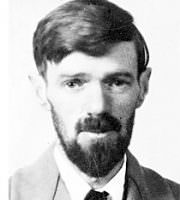About D. H. Lawrence
David Herbert Lawrence (born September 11, 1885 in Eastwood, Nottinghamshire, died on March 2, 1930 in Vence, France) was an English poet and writer who came from a working-class family as the first writer of rank in 20th century English literature.Two profound polarities from his youth formed the structure of the development of DH Lawrence's entire literary oeuvre: On the one hand, the irreconcilable social, class-related differences in mentality of his parents led to continuous family conflicts, which were only occasionally caused by the cross-border power of the mutual erotic attraction between his father and his mother were toned down. Lawrence tried to deal with these conflicts in his novels, short stories and in many of his literary productions, as it were, self-therapeutically. On the other hand, primarily in his later fictions of the 1920s, he projected the conflicts of loyalty that had arisen between his excessively strong, oedipal attachment to the possessive mother and his displaced or repressed attraction with regard to the unconsciously dark, and in part suppressed, fascination for the male- In his late work, the virile energy or way of life of his father imaginatively affected that erotic fascination that the socially inferior, cultural otherness of his phallic-masculine male figures exerted on his socially superior protagonists.
In the same way, structure-forming for Lawrence's literary oeuvre, also in the sense of a simultaneity of the non-simultaneous, is the contrasting and conflict-laden coexistence of a modern, capitalist-industrial civilization, the world of his father, and the idyllic-traditional way of life and time rhythms of an agrarian-rural England as Lawrence experienced it topographically in Nottinghamshire, the place of origin of his influential childhood sweetheart Jessie Chambers. Lawrence tries to capture this in the third part of his generational novel The Rainbow (1915) based on the constant vacillation of his protagonist Ursula Brangwen between backward-looking natural longings and forward-looking emancipation efforts in the modern world of work.
This deeply structured contrast between the critique of civilization and the affirmation of life is also constitutive for the entire literary work of Lawrence, in which the radical, fundamentalist criticism of modernity with regard to the rationalistic, but at the same time mechanistic omnipotence fantasies in the consciousness of individuals is based on Lawrence's orientation a pantheistic wisdom of organic natural processes and a bodily incarnated unconscious.
In the context of the various individual topics that Lawrence dealt with in his entire work, what should ultimately be emphasized above all is his endeavor to empathize with passion in natural processes and to grasp cosmic laws that are subordinate to humans, animals and plants to the gaze of his readers and to sharpen readers for the respective inherent laws of these natural and cosmic coincidences. From the specific rhythm of the world of experience he portrayed, in addition to the literary form of the narrative, the form of expression of the poem resulted for him at the same time, whereby he avoided a method of composition that obeyed the rules of a given normative poetics. He found suitable means of expression in his poems, especially in vers libre, whereby this relaxed form of poetic representation made it possible for him to express his lyrical work with the same intensity as he did in the outstanding scenes of his novels or in the grandiose ones Descriptions of nature in his travel diaries succeeded.
Browse all poems and texts published on D. H. Lawrence
His best known poems are the Tortoise poems, and "Snake", one of his most famous and frequently anthologized.









